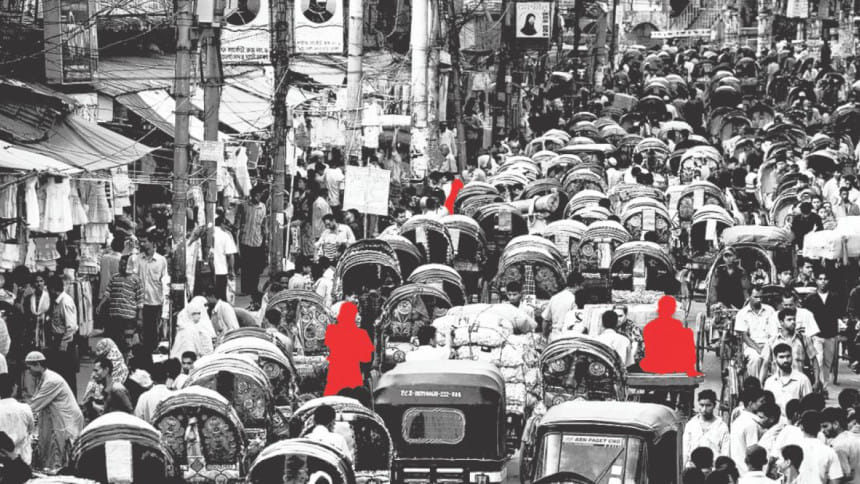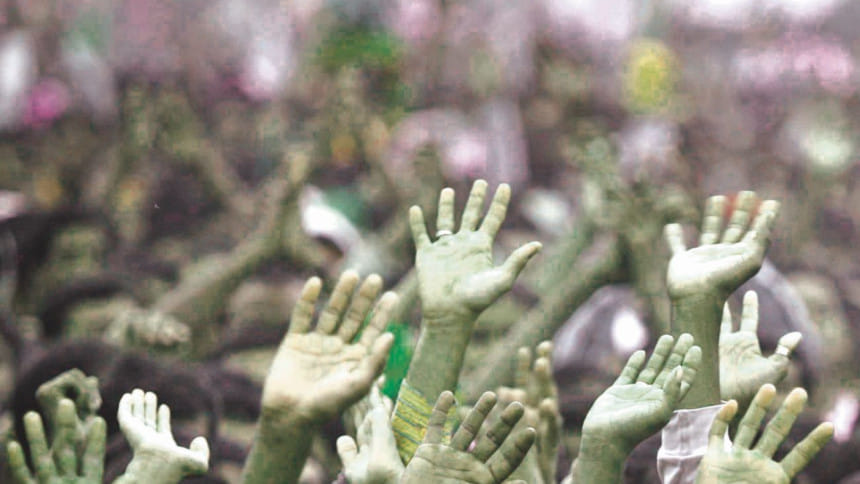The ones who never returned

The end of 2017 witnessed the return of a number of individuals who had disappeared in the second half of the year. Most of the 15 individuals, who had been missing since August last year, either returned to their respective families in the last three months or were shown as arrested based on various cases.
For instance, both Mubashar Hasan from North South University and journalist Utpal Das were found after close to two months. Party leaders Syed Sadat Ahmed from the BNP and MM Aminur Rahman from the Bangladesh Kalyan Party, both of whom were missing for four months, were shown as arrested by the police towards the end of December.
The returning spree—regardless of whether or not the individuals were shown as arrested— towards the end of the year did help many families and friends breathe easy, allowing them to end the year on a better note. But not everyone who "disappeared" last year has had a happy ending though.
According to human rights body Ain o Salish Kendra (ASK), at least 30 out of the 60 individuals who were victims of enforced disappearance last year are yet to be traced. 23-year-old Abdullah Al Faruk from Rajshahi, son of freedom fighter Mohammad Jahiruddin, is one of them.
Faruk, who went missing on July 18 last year, had just given his HSC exams and used to work as a part-time electrician. On the evening of July 18, he received a call from a Torikul Islam, who had requested him to come home to fix something. As Torikul's house was far away, Faruk took his father's bike and his neighbour along with him.
According to Jahiruddin, Faruk was picked up by people who identified themselves as members of the Rapid Action Batallion (RAB) from Torikul's residence. RAB, however, subsequently denied any involvement in the abduction.
When Jahiruddin, a retired constable who worked for the police for more than four decades, tried to file a case at the police station, he was denied. As a result, he filed a case at the Judicial Magistrate Court, after which the Police Bureau of Investigation (PBI) was asked to investigate the matter. According to PBI's report, they found some "valuable information" regarding Faruk's disappearance. However, nothing more was revealed.
A frustrated Jahiruddin, who left no stones unturned to find his son, does not know what step to take next. "I still don't know where my son is. There is barely any progress on the case. All the authorities keep telling me is to be patient. My son has been missing for six months now; how can you expect me to be patient?" asks Jahiruddin.

"I am really tense about the state of my family. I am afraid that my wife and my children may have a breakdown any time. They are all depressed and they haven't eaten properly for the last six months. I have lost one son, I don't want to lose anybody else," laments the 67-year-old. Jahiruddin's hopes had risen for a brief period towards the end of December last year when a host of missing people were returning home. However, the false hope ended up making him feel worse.
While the past abductions mainly involved political leaders, 2017, for the first time, saw individuals disappear from a wide array of circles—from teachers to journalists to doctors.
Like Jahiruddin's, there are hundreds of families—most of whom lost their relatives between 2013 to 2016—who have no clue as to the whereabouts of their missing relatives. To be more precise, according to ASK, around 519 people have allegedly fallen victim to enforced disappearances between 2010 and 2017, with 329 of them still missing. One can only imagine the heartwrenching situation of those who have been away from their loved ones for years.
Ferdousi Rahman, sister of BNP leader Sajedul Islam Sumon, who was allegedly picked up by law enforcers in 2013, best describes the situation. "If the families of the recent victims have suffered for three or four months, we have suffered for more than a thousand nights and it's only going to continue. Trust me when I say this. It's not humanely possible to bear this pain."
According to Ferdousi, Sumon and four of his friends were picked up by individuals who identified themselves as RAB from Bashundhara on December 4, 2013. RAB, however, denied the allegation a number of times.
"When my brother and his friends were getting ready to return home, three vehicles came in and hastily stopped them. They were first beaten very badly with metal pipes and then all five of them were forced into the car. We haven't seen any of them since. We came to know about all of this from the labourers who were present at the construction site over there," she explains.
"What makes me really frustrated is that it has been so many years since my brother disappeared, but the law enforcers have not even begun the process of finding him," she adds.
Over the last four years, Ferdousi's family used up all their contacts in a bid to trace Sumon. They went to the police, they visited RAB headquarters and even went to court. According to Ferdousi, her mother ran to-and-fro the offices of various law enforcement agencies every week for the first three years.
"Do you know what my mother tells the watchman time and again? She says 'If you see a madman, or a beggar approaching the house, don't yell at him or ask him to leave. Call me first. That might be my son,'" a teary-eyed Ferdousi says.
The case of Moklesur Rahman Johnny, a homeopath who went missing on August 4, 2016 in Satkhira, is even more astounding, primarily because Johnny's wife, Jesmin Nahar, actually met him after he was abducted.
Upon finding Johnny's phone switched off, Jesmin looked for her husband in various police stations in Satkhira and eventually found him at a thana. She was even allowed to bring her husband food and was in touch with him for the next three days.
After three days though, her husband "disappeared". To her shock, the officer-in-charge of the thana actually denied arresting her husband in the first place. Desperate for justice, a three-months-pregnant Jesmin filed a writ petition with the High Court, which prompted the court to order the Chief Judicial Magistrate of Satkhira to investigate the case.
According to the Magistrate's report, which was submitted July last year, Jesmin's husband was, in fact, present in the station. It was a big win for Jesmin and her family. After that, the court directed the PBI to investigate the case and submit the report by October 3. However, the PBI did not submit any report. Instead, they were given a three-month extension.
In order to reach this position though, Jesmin has had to overcome a myriad of obstacles in the last 15 months. She has had to run to-and-fro her home in Satkhira and the High Court in Dhaka for the first six months, all while she was pregnant.
Her father-in-law suffered multiple strokes due to the tension, while her mother-in-law recently had a car accident. Johnny was the sole earner in the family. With him gone, the family has been living off their relatives for the last 15 months.
Despite all the sufferings though, Jesmin believes that it will all be worth it "when" her husband is "released".
"We are still hopeful. He is not into politics. He did not do anything bad either. We honestly believe that the people who have him held will soon realise that it was all a mistake and let him go," a hopeful Jesmin says.
A majority of the families who have lost someone have not been as lucky as Jesmin, as far as the progress of the case is concerned. Many families allege that they were not even allowed to file cases at the police station.
Human rights activist Nur Khan Liton believes that cases should be filed for each of these incidents, regardless of the support that the family receieves.
"At least if the cases are accepted and a final report is given, then the incident will be recorded, and one day in the future, when the situation of the country is better, there will be a chance for these families to get justice," says Nur.
On December 10 this year, relatives of victims of disappearance took part in a demonstration at the press club in Dhaka. With 27 families participating in the programme this year, it was the biggest turnout till date.
57-year-old business man Shafiqur Rahman was one such father who had attended the programme. His son Saifur Rahman Shojib, went missing on February 18, 2015. Ever since then, Shafiq and his wife have been struggling to cope both mentally and professionally.
"I used to have a decent rent-a-car business. After I lost my son, I couldn't concentrate on anything. I used to run from one place to another hoping to get some news about him," says Shafiqur.
After two years of suffering losses, Shafiqur eventually shut down his business and made some small investments instead, which help his wife and him stay afloat today. Shafiqur claims that some of his sources had given him a rough idea about the whereabouts of his son and that he managed to track him for six months. However, after half-a-year, he had lost all trace.
"People will say that my son was at fault, because he was involved in politics. Is it a crime to be involved in politics? There were never any cases filed against him. He wasn't a terrorist. But today, I don't know where he is. If he was dead, I would have at least arranged prayers for him, but I can't even do that," exclaims Shafiqur.
"Everything is in disarray. I am talking to you right now and I am sure that I won't be able to sleep at night because I will be thinking about my son. I have a grandson who I have to lie to everyday. I have a daughter-in-law, who despite being in her 20s, has decided not to marry again. There are so many things that I need to fix," says a teary-eyed Shafiqur.
Recent statements made by the government paints a bleak picture as far as the fate of these families are concerned. Prime Minister Sheikh Hasina, while responding to a question related to enforced disappearances, claimed that such occurrences were more frequent in Western countries, such as the United Kingdom. Rights activists criticised the premier for her statement, arguing that in saying so she had actually indirectly justified the incidents.
While the return of the individuals at the brink of the end of 2017 is good news, one must not forget that there are still many more individuals who are missing. And one also can't ignore the fact that despite the nonchalant attitude of the government, the families still have a flicker of hope.
Shafiqur's statement perhaps best sums up the kind of belief and hope that these families have been living on. "My son has been missing for two years. That's a long time. But I know one of his friends from Badda who had been missing for 16 months and he returned home one fine day. If he can return, why can't my son? I still don't believe he is dead."

 For all latest news, follow The Daily Star's Google News channel.
For all latest news, follow The Daily Star's Google News channel. 



Comments